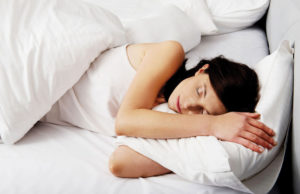Focusing on Sleep Can Make a Difference in a Woman’s Health
Too many things Can get in the way of sleep. You need to Make it a priority.
Although adults should sleep seven to nine hours per night for optimal health, more than a third of U.S. adults report insufficient sleep—less than seven hours of sleep daily. Many people often cut corners on sleep—waking up early and staying up late—to accommodate busy work schedules, activities outside work, child-rearing and household responsibilities. In addition to insufficient sleep, millions of people also experience sleep disruption or disorders.
Studies show that women experience more difficulty sleeping and suffer from more sleep disorders than men do. In fact, women are about twice as likely to have trouble falling asleep as men, and this problem increases with age.
 Hormone changes during a woman’s menstrual cycle, during pregnancy and during perimenopause (the transition into menopause) can impact a woman’s body and interrupt her sleep cycle. It’s important for women to be aware that these changes occur, to understand their effects and to know what can be done to treat them.
Hormone changes during a woman’s menstrual cycle, during pregnancy and during perimenopause (the transition into menopause) can impact a woman’s body and interrupt her sleep cycle. It’s important for women to be aware that these changes occur, to understand their effects and to know what can be done to treat them.
Sleep deprivation can compromise the immune system, and that can cause you to be more susceptible to viruses and bacterial infections as well as to long-term health issues such as heart disease and diabetes. Lack of sleep or poor sleep can lead to irritability, depression, anxiety and memory loss, and can also increase the chance of accidents and decrease your productivity.
In short, neglecting sleep is not a recommended practice, because sleep is as important to your health as a well-balanced diet and regular exercise. Sleep is vital because during sleep, the body rests and the brain recharges while toxins are cleaned from the brain and memories are sorted.
Women and Sleep
Hormone changes during a woman’s menstrual cycle can affect sleep. As levels of estrogen, progesterone and serotonin rise and fall, these changes can alter a woman’s sleep cycle, making it harder for her to fall asleep or sleep through the night.
Some women experience heat intolerance during hormone changes, which can impact sleep as well. During pregnancy, heat intolerance as well as additional weight gain and the position of the fetus can affect a woman’s sleep cycle. In these situations, staying hydrated and making small changes such as not wearing heavy pajamas and using a fan or air conditioner for comfort can make a difference. Women who experience severe cramps that disrupt sleep should talk with their physician about treatment options.
During perimenopause and menopause, women often experience sleep disruption caused by hot flashes and night sweats—about 75% to 85% of women report sleep problems during this time. Changes in estrogen levels, particularly for perimenopausal women in their 40s, can prompt these symptoms. Very often, perimenopausal women wake early in the morning and have trouble getting back to sleep.
Increasing Your Chances of a Good Night’s Sleep
There are things women can do to increase their chances of a better night’s sleep. For example, creating a consistent schedule with a regular wake-up time and regular bedtime, seven days a week, is an important step. Eating healthy foods and avoiding caffeine, alcohol and large meals before bedtime will also help.
Exercise can also enhance sleep. Women who exercise are much more likely to be tired at the end of the day, which increases their chances of a restful night’s sleep. Practicing meditation or yoga may also help some women improve their sleep.
As you may know, electronic screens can contribute to sleep problems. Televisions, phones, electronic tablets and computers emit a blue light that can affect your level of melatonin and reduce the likelihood of falling asleep. If your partner is using a screen, wear a sleep mask to avoid the blue light.
Being conscious of your comfort level and making sure the room is quiet and is a cool temperature can improve your chances of falling asleep as well.
When to Talk with Your Physician
Women should talk to their physician if they feel sleep deprivation or lack of restful sleep is affecting their quality of life, including their ability to work, exercise, or find time for friends and family.
It’s important to rule out medical conditions—including depression or anxiety—as the cause of sleep problems and interruptions. Talk to your doctor about the medications you take—for allergies, high blood pressure, asthma—because some can affect your sleep. In cases of perimenopause and menopause, your physician may suggest hormone replacement therapy.
Sometimes, there may be an underlying medical condition that prompts a physician to refer a patient to a sleep center or lab for a clinical study. Centers that specialize in sleep disorders will spend time learning about your symptoms and how your disrupted sleep affects your life.
Overnight sleep studies may be done, and the tests conducted while you sleep provide information on your condition. Several local hospitals and clinics operate sleep labs that conduct tests for conditions such as insomnia, narcolepsy, restless legs syndrome or sleep apnea.
Quantity of sleep is not the same as quality of sleep. For example, if you’re in bed for eight hours but your partner’s snoring keeps you awake, you may not be getting the quality of sleep you need. It’s important to discuss your symptoms, your lifestyle and your home environment with your physician.
Understanding the effects of hormone changes, environmental factors and lifestyle habits can help women enjoy a good night’s sleep. Studies show that a person who makes a commitment to sleep often notices an increase in productivity, motivation, creativity and the quality of their relationships.
A good night’s sleep can make a world of difference in your health, your life and your family’s life.
 Kristine M. Leaman, M.D., is a physician with All About Women – Tower Health Medical Group, specializing in gynecology and the da Vinci® Surgical System. She is a North American Menopause Society (NAMS) certified menopause practitioner. Dr. Leaman completed residencies at Lancaster General Hospital and Reading Hospital before joining Tower Health Medical Group.
Kristine M. Leaman, M.D., is a physician with All About Women – Tower Health Medical Group, specializing in gynecology and the da Vinci® Surgical System. She is a North American Menopause Society (NAMS) certified menopause practitioner. Dr. Leaman completed residencies at Lancaster General Hospital and Reading Hospital before joining Tower Health Medical Group.
